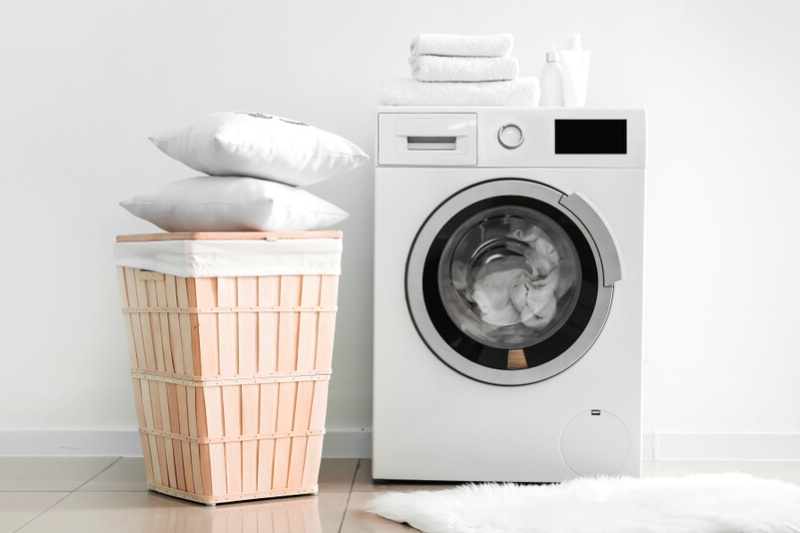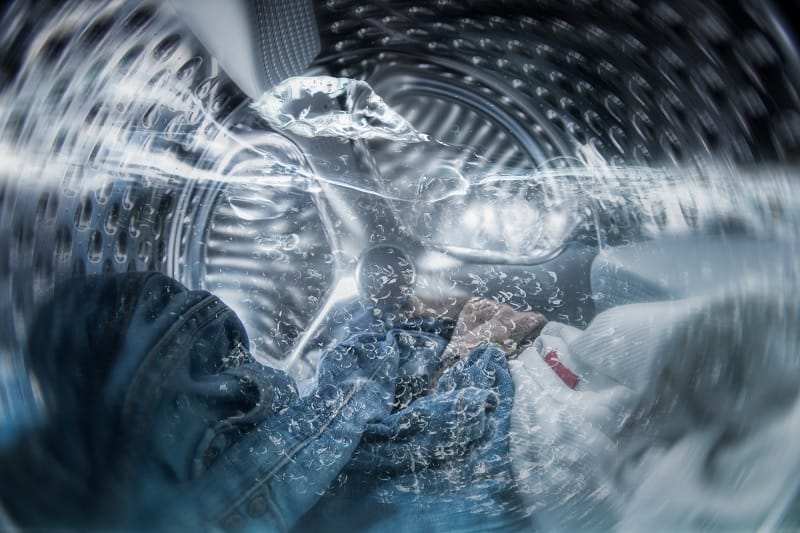Choosing the right washing machine for your home can be a little tricky because there are so many factors to consider before you make such a significant investment.
To ensure you make an informed decision, consider these factors:
- Capacity
- Efficiency
- Space
- Type of washing machine
- Features and cycles
- Budget
- Brand
- Reviews
Let’s look at these in more detail.
Type of Washing Machine
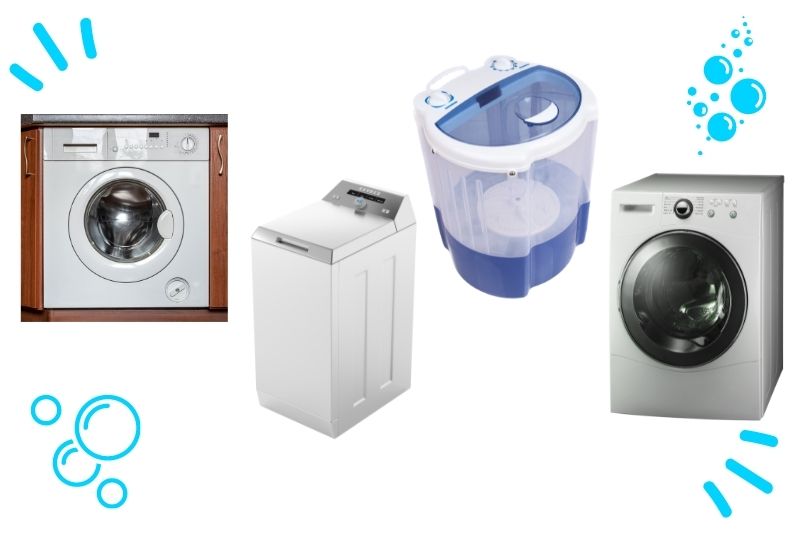
Before you make a purchase, think about what type of machine you need:
- A freestanding washing machine – either front loading or top loading.
- An integrated washing machine – goes behind a cupboard door.
- A washer-dryer – cleans and dries clothes.
A freestanding washing machine is the most common kind in the UK. It’s a machine that can be placed under a counter or in an open space, and it needs to be connected to a water supply and electricity to work.
An integrated washing machine slots into a cupboard space. You can then close the cupboard door when the appliance is in place, and you won’t know the machine is there.
A washer-dryer is a machine that can clean and dry clothes. It’s a space-saving option. A washer-dryer can be freestanding or integrated.
Consider the benefits and drawbacks of each appliance and choose the machine that suits your home.
Energy Efficiency
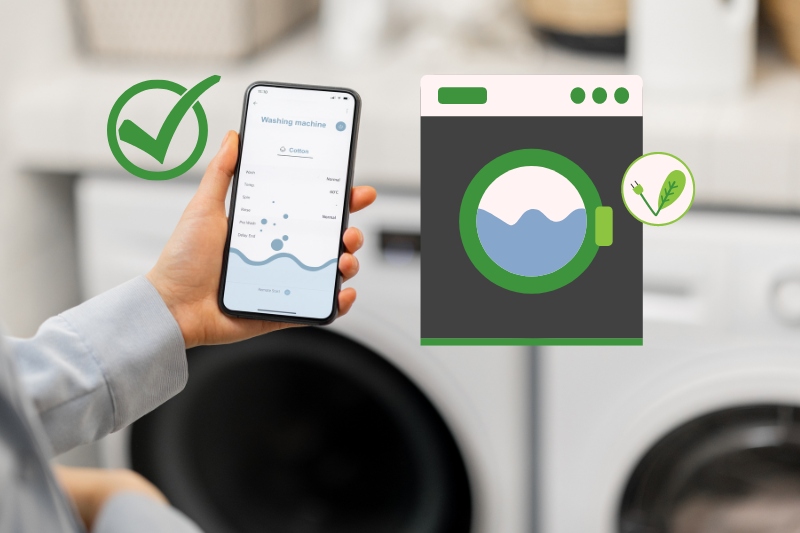
In the UK, machines are rated with an energy rating from A to G, with A being the best. Energy-efficient models consume less water and electricity, saving you money on utility bills in the long term. It’s also better for the environment.
Although an A rating is considered the best, these machines can come with a heftier price tag. Of course, a beefy price doesn’t suit everyone. So, consider other models that have a lower energy rating but are cheaper.
Load Capacity
A washing machine’s load capacity refers to how much laundry you can put inside the drum. Load capacities vary from around 5 kg to 12 kg, the most popular sizes being 7 kg to 9 kg.
What load capacity your washer needs depends on your unique home situation.
For example, a 6 kg to 8 kg capacity will suit small to medium-sized families. A larger family, for example, parents and three kids, would benefit from a 9 kg to 12 kg washing machine because they’d be washing more laundry.
Keep in mind that the bigger the machine, the more energy it’ll consume per load. However, it can be more efficient to have a bigger machine as you won’t need to run so many loads.
Assess how much laundry you do per week and try and weigh out your current loads. By doing this, you will get a better idea about what capacity you need.
Spin Speeds
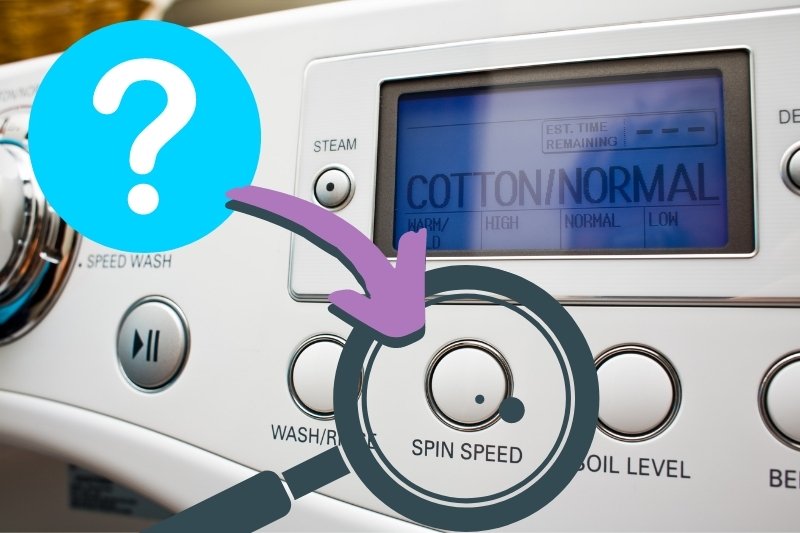
As a guide, washing machines in the UK have a spin speed between 1000 RPM and 1600 RPM. This means that the drum rotates 1000/1600 in a minute, during which time the clothes in the drum lose their moisture.
The quicker the spin speed, the more water that gets extracted from the clothes, meaning that they’re not soaking wet when they leave the drum. Consequently, the clothes dry faster.
However, a vigorous spin can occasionally be more expensive to run, noisier and won’t be suitable for all kinds of materials, like wool and silk.
In most cases, an RPM of 1400 is ample and is what many UK washing machines have. Plus, you can always run your clothes through an extra spin if they’re a tad too wet for you when the cycle ends.
Programs and Settings
When picking a new washing machine, think about what you need your appliance to clean. Your answer will determine what type of programs and cycles your machine needs to have.
For example, do you need a machine that can clean a mixed load of washing on a regular basis? Or do you need a machine that can handle delicate materials frequently? Based on this, you can choose a machine that actually suits your needs.
If in doubt, buy a machine with a variety of washing cycles, like hand wash, wool wash, quick wash, and eco-friendly options. This way, you can pick and choose a program as and when you need it.
It’s also worth checking out if the machine of your choice has a customisable setting so you can customise a cycle’s temperature and spin speed to suit your load.
In addition, many machines come with ‘self-clean’ cycles these days. It’s a handy cycle to run from time to time to wash out your appliance. The cycle removes excess dirt, detergent and softener from the machine and keeps it in great form. It also means you don’t have to use up your energy cleaning the washer – a huge bonus if you ask me!
On the topic of programs and settings, remember to choose a machine that is easy to operate. Don’t pick a fancy machine that’s Wi-Fi enabled and controlled via an app if you don’t understand how to use it.
Sometimes, it’s better to have a simple control panel with minimal buttons because it’s more straightforward. You don’t want to argue with the washing machine whenever you want to use it.
Cycle Lengths
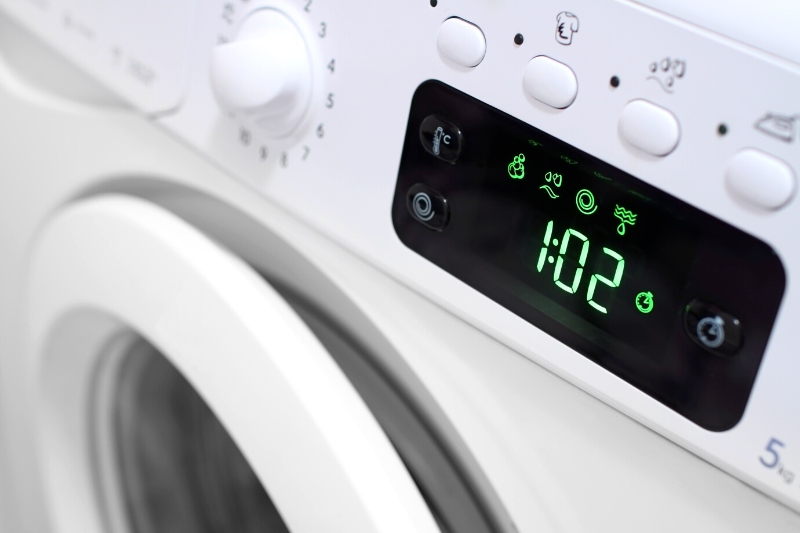
When selecting a washing machine, consider how long the average cycles last in relation to your weekly schedule.
Some basic cycles take a long time to finish on some washing machines but are quicker on other models. So, consider what type of schedule you have and try to fit the washing cycle times into it.
For example, for busy lifestyles with frequent laundering needs, like washing uniforms and PE and rugby kits, opt for a washing machine with quicker cycles. You don’t have time to wait for long washing cycles to finish. If time is not a constraint, longer cycle times won’t bother you much.
This obviously isn’t a perfect science. But you can try to choose the most suitable machine for you.
Noise Level
Washing machine noise pollution isn’t going to bother everyone, but it’s something worth considering if you live in a shared living area, a flat, or have an open-plan living space.
In these cases, the hum and vibrations from the appliance could disturb and annoy your neighbours, or you might have to turn your TV’s volume up just to hear what’s being said over the noise of the washing machine.
In addition, if you run your washing machine at night, you don’t want an overly loud appliance clunking and waking you and other family members up.
Of course, if you have a utility room or store your washing machine away from your living space, you don’t have to worry too much about the noise.
Build Quality and Brand Reliability
As mentioned earlier, getting a washing machine isn’t cheap, so you want to buy the best machine possible for your money.
One way you can do this is by buying goods from reputable brands that you know have experience in the industry.
Of course, every brand has a slip-up now and again. But it’s a good place to start when researching what machine to get.
Do the following:
- Choose a reputable brand that’s known for building quality goods.
- Read reviews online.
- Ask family and friends about their experience with certain brands.
- Check out independent reviewing sites to see what they have to say about the brand/machine.
- Talk to sellers and ask them questions about each brand. Salespeople know what brands sell well and what common problems you will likely face with specific models.
- Pick a machine that comes with a long warranty and cover for parts.
- On the topic of warranty, read up on warranties to see what they cover. Not all warranties are good. So, make sure you read the fine print just to make sure that you’re covered for ‘basic’ problems.
Size
Another vital factor to consider is the size of the washing machine.
In the UK, washing machines are either put under a worktop and left exposed or integrated into the rest of the kitchen and hidden behind a cupboard door.
So, depending on where your washing machine is going, you must measure the available space and buy a machine that fits the gap.
As a guide, the slot under a worktop where you slot a washing machine is approximately 85-90 cm high, 60 cm wide and 60 cm deep. Therefore, you’d need to buy a machine slightly smaller than these measurements so it can slide into the gap. The depth tends to change from machine to machine, but this doesn’t matter much.
Integrated washing machines, on the other hand, are usually 85 cm high and 60 cm wide and have a depth of 40 to 65 cm. You should also leave an additional 7 cm for the pipes at the back of the appliance.
Make sure the washing machine will fit into the designated space. Consider if there’s enough room for the door to open, how easy it’ll be to maintain the appliance, and consider any obstructions or potential issues with the pipework.
Budget
Your budget is unique to you. So, assess what you need from a washing machine and buy an appliance that suits your budget. Consider what must-haves you need and what likeable features you can potentially discount to lower the cost if need be.
Don’t overpay for a machine that comes with fancy features that are never going to be used. Buy a machine that suits you and your family.
Washing machines, on average, cost around £300 to well over £2,000. Naturally, the more features and modern tech you add to the appliance, the pricier it gets.
Sometimes, you can get washing machines at discounted prices, like when there’s a Black Friday deal. But you can assume you’ll pay a few hundred pounds for your new washing machine.
In addition to the initial outlay, consider hidden costs that might be added to your bill. For example, are there any delivery or installation costs involved? What about taking away your old machine?
These costs won’t apply to everyone, but they can bump up your final bill a bit. Also, the date and time you get appliances delivered can impact the cost.
Check Out the Reviews
Before you make a purchase, make sure you check out the reviews on your desired washing machine.
By reading reviews, you’ll find out what the appliance really works like, what real-life problems it has and what users genuinely love about the machine – this is the stuff you generally won’t hear about in the product description.
Some points to look out for include but are not limited to:
- How easy is the machine to use – what’s the control panel like?
- How much noise does the washing machine make – does it vibrate and rattle a lot?
- How long are the cycles – are they overly long?
- Does the washing machine clean clothes well – do you need to adjust programs or use a special detergent to make the most of the appliance’s cleaning abilities?
- Does your washing machine of choice have a unique cycle that you need – what does this cycle work like in reality?
Look for common themes in reviews and use the information to make a better decision.
Additional Features to Look For
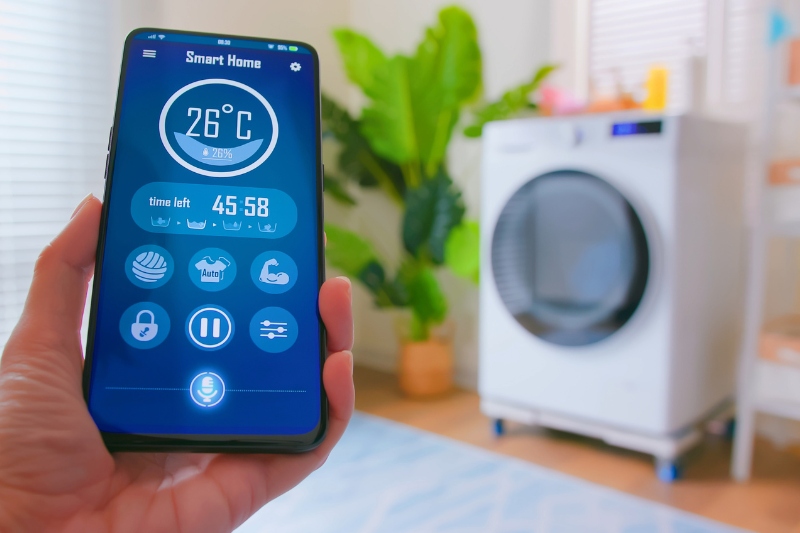
Here are some extra features you might be interested in keeping an eye out for:
- Smart features – Do you want your washing machine to connect to Wi-Fi? This feature is more for convenience but isn’t a must-have.
- Steam function – This can help to reduce the wrinkles on your laundry.
- Delay start – You can use this feature to start your washing cycle at a more convenient time. Like during off-peak electricity hours.
- Child lock – Many machines already have this feature, but only some users need to use it.
- Anti-stain cycle – This cycle automatically adjusts the water temperature and agitation of the drum to remove stains from clothes – a likeable and time-saving feature but not essential.
- Auto-dosing – This feature releases detergent at optimal times during the wash so that clothes are cleaned effectively.
Final Thoughts…
When your washing machine breaks, it’s easy to dash off to the nearest appliance store and dump a load of money on a new appliance.
However, you should take a few days to mull the problem over. By doing this, you can research what new machines are available and what features they come with, so you can buy the right machine for your home.
Yes, you can get by with a random washing machine if you have to. But picking up a machine that suits your washing habits and routine is much better.
Consider the following:
- The type of machine you need – freestanding, integrated or a washer-dryer.
- The energy rating of the appliance.
- What load capacity do you need?
- What spin speeds are best for you?
- What cycles must you have, and how long do they need to be?
- Think about noise pollution.
- Buy from quality brands with excellent reputations and reviews.
- Make sure you buy a machine of a suitable size.
- Stick to your budget – don’t buy something ‘for the sake of it’ because you’ll regret it.
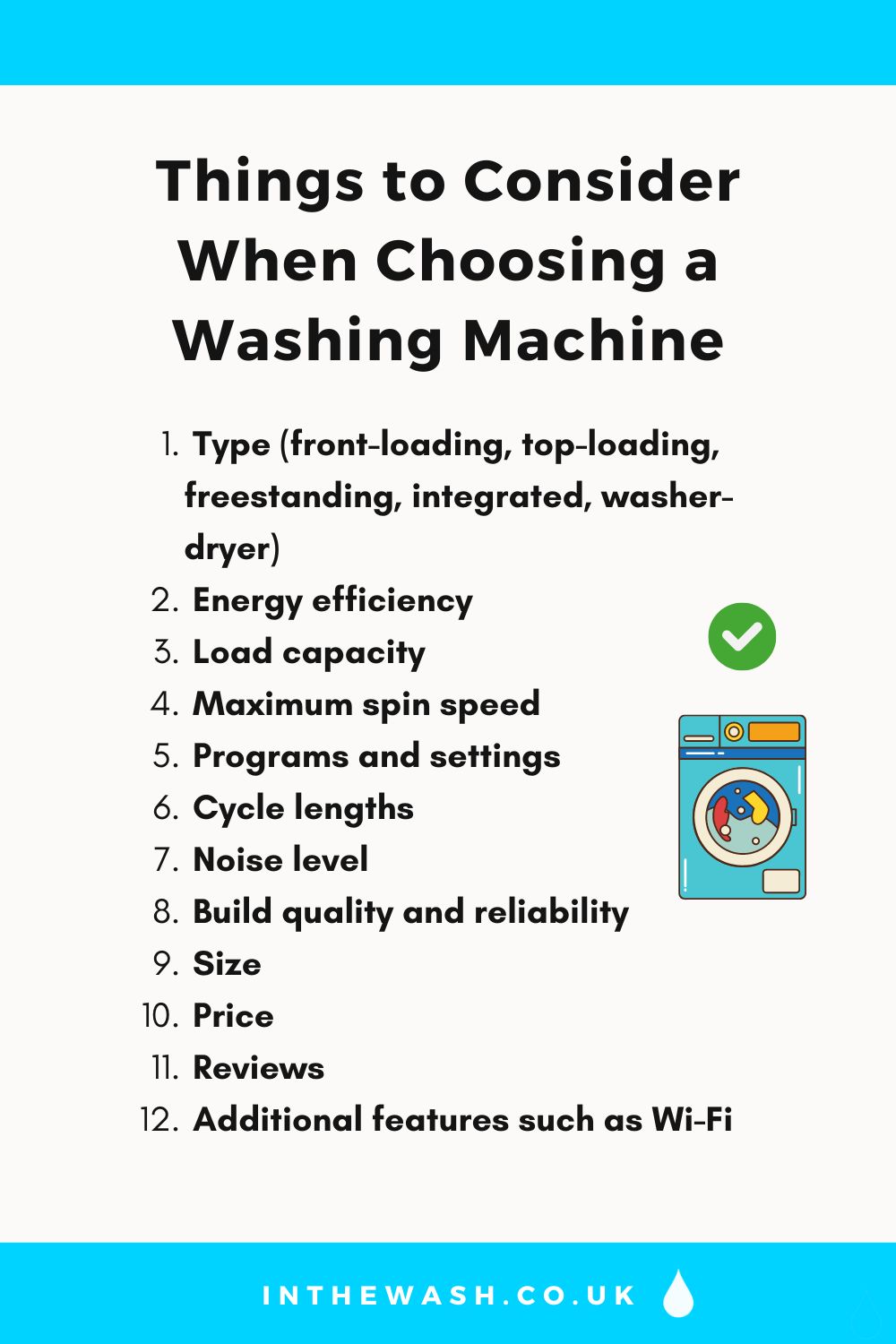

Bethan has a passion for exploring, reading, cooking and gardening! When she’s not creating culinary delights for her family, she’s concocting potions to keep her house clean!
